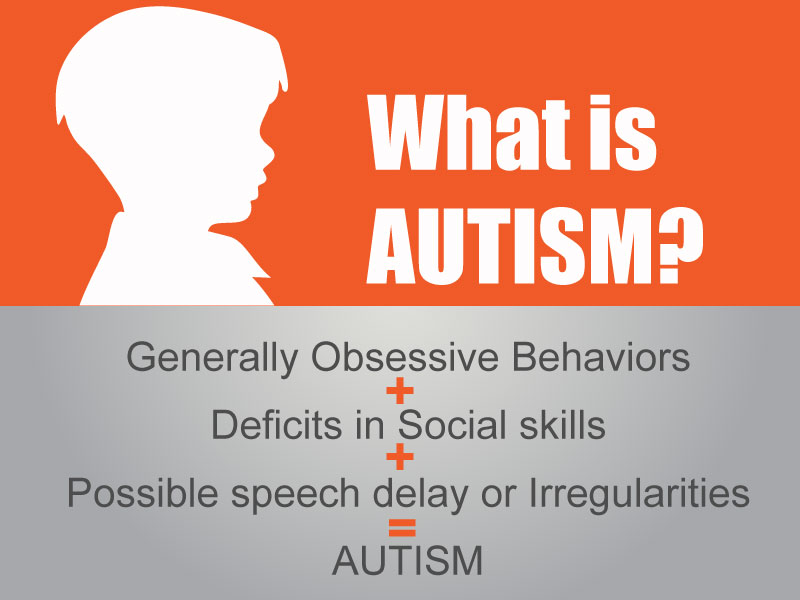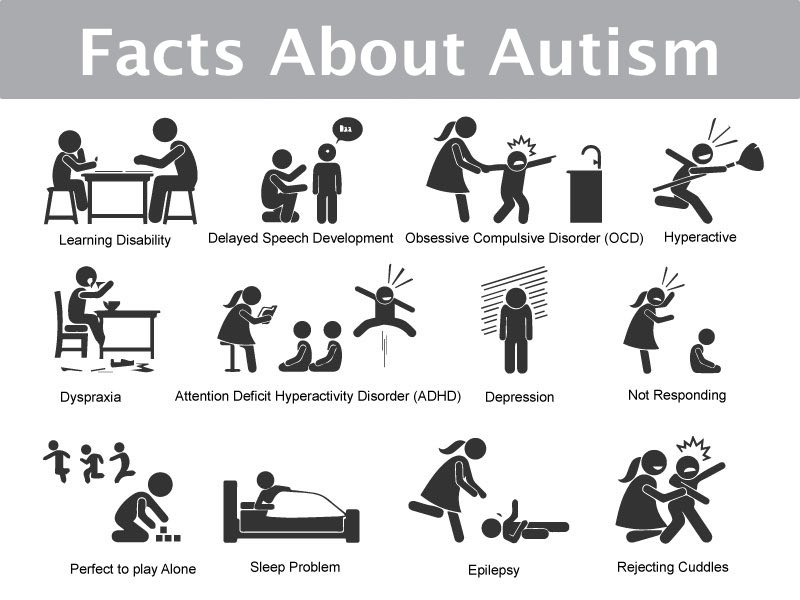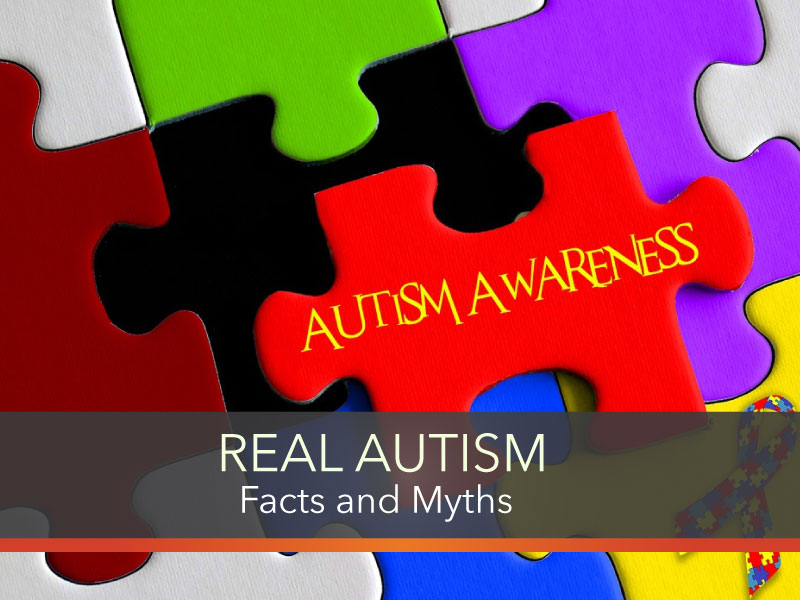Autism, or autism spectrum disorder (ASD), is a highly variable neuro-developmental disorder. Due to this variability, there are many prevalent myths about autism. Therefore this article, the attempt be to share all the autism facts and statistics in one place. So if you do not know enough about Autism, you will find all the interesting facts about autism right here.
Contents
- Autism Awareness facts
- What is Autism?
- Autism Fact Sheet
- DSM 5 Autism spectrum disorder fact sheet
- True Autism facts for Teachers: Debunking Myths about Autism
- Interesting Facts About Autism
- Medical Conditions associated with Autism
- Medical Condition: Real Autism facts – You do not know
- Autism Awareness Month
- What can we do?
Autism Awareness facts
- Autism is a developmental and neurological disorder that begins in early childhood and lasts throughout life. It is diagnosed across an entire spectrum, and is also known as Autism Spectrum Disorder.
- Autism is characterized by challenges and troubles faced by a child related to impairments in (20):
- Social interaction
- Communication and restricted interests
- Repetitive behavior.
- These three symptoms occur overtly during infancy and usually begin after six months.
- The symptoms of autism become established by age two or three years and continue into adulthood, in a muted form.
- Autism is referred as a “spectrum” of disorder, as it refers to the wide variation of challenges and strengths faced by people.
- With the variability Autism Spectrum Disorder can be of many types of autism characterized by varying combinations of genetic and environmental influences.
- Autism was initially known as “Early Infantile Autism” or “Kanner’s Syndrome”.
- Autism is an umbrella term. People with ASD show a range of symptoms.
- ASD also includes Asperger syndrome and pervasive developmental disorder not otherwise specified (PDD-NOS) .(1)
What is Autism?
Autism is marked by troubles with learning, social interaction and communication, and repetitive behavior. Though there is no cure, early interventions help children learn and communicate better.(2)
Parents can identify signs of autism within two or three years of their children’s life. Children with autism show difficulty in learning or communicating, and rigid, repetitive behavior.
Children with ADS can be extremely sensitive. To help people with autism, we must understand the nature of the disorder. We should know how to separate myths from facts about ASD.

Autism Fact Sheet
- Autism now affects 1 in 59 children.
- Every 1 boy in 37 boys is affected by Autism. Prevalence figures of Autism are on the rise.
- In the U.S., Autism is one of the fastest-growing developmental disorders. (13, 14, 15)
- Boys are nearly five times more prone to Autism than girls. (13, 14, 15)
- There is no known cure or medical detection for autism .
- Around 20% of the U.S. population still thinks that vaccines cause autism .
- Around 70 million people worldwide have autism .
- If case of identical twins, if one is diagnosed with autism, then the other has about 90% of chance to develop an autistic disorder .
- In some cases, autism may be linked with a family history of chronic or manic depression .
- In case of extremely premature infants, one in 10 children is tested positive for autism. Generally, children born three months earlier compared with nine months have double the expected rate of autism .
- Autism is more common compared with childhood cancer, diabetes and AIDS .
DSM 5 Autism spectrum disorder fact sheet
The Diagnostic and Statistical Manual of Mental Disorders, or DSM, is formulated by the American Psychiatric Assosiation. The DSM-5 deals with detection of ASD.
The 2013 DSM-5 manual has broadened the criteria for autism diagnosis to include those whose symptoms are not detected until social demands are made later.
The new criteria include detecting deficits in social communication, abnormal body language or eye-contact, deficits in verbal and non-verbal communication, repetitive motor actions, fixated interests, rigid adherence to routine, insistence of sameness and hyper or hypo-active response to stimuli.
Parents, teachers and caregivers can look at the “Autism Spectrum Disorder” factsheet under the “Updated Disorders” here.

True Autism facts for Teachers: Debunking Myths about Autism
1. Autism is not a disease.
Autism is a complex neurological and developmental disorder. How it happens is not well understood. Scientists say the causes are genetic and multi-factorial. (16)
Autism alters how the brain processes information. This is the result of alteration in how nerves and synapses connect in the brain.
2. Autism is not caused by vaccines.
This is a thoroughly debunked myth, though it continues to be popular among a section of people. This has been conclusively proven to be false. (17, 18, 19)
Many parents become aware of the condition of their children when they go to get vaccines, which lead some to believe it is caused by vaccines. Research shows that people with certain genetic make-up are more susceptible towards autism.
3. There are pre-natal risk factors associated with autism.
Some doctors warn about risk factors lie infections or consumption of alcohol or cocaine during pregnancy. Research also shows that autism can be caused by environmental factors, like pre-natal exposure to air pollution, especially with heavy metals and particulates. (3)
However, not much is known about how these result in autism. Some theories try to link autism with pre-natal stress, exposure to plastics, diseases, flame retardants and solvents. So far, there has been no medical evidence to support these claims.
4. Children with autism are not antisocial or un-emotional.
People with autism have trouble communicating with others. They also engage in repetitive or strange behavior like humming, rocking and flapping hands. This often seems odd to their peers.(4)
Autistic children also have rigid and narrow focus, and often concentrate hard on something. The way their brains process information is different than others.
They may not respond to talk, may avoid eye contact or stay lost in their own world. As a result, others think that they are anti-social and are emotionally vacant.
Social stigma and prejudices often stop people from trying to befriend autistic persons. Ignorance about ASD often leads to social isolation of autistic children, which may have adverse effect on their development.
5. Children with autism are not more aggressive.
There is no evidence to the claim that children with autism are more aggressive. In any situation, there are some children who may cry, shout or hit out when distressed. Children with autism are no different than them.(5)
Autistic children are often extremely sensitive. Environment or social situations which appear “normal” to others may result in sensory overload in children in ASD. As a result, they can get distressed easily.
Autistic people like routine and order. Disruption of that may lead to distress. Most autistic children do not like to be hugged, as this gives them a sense of confinement and adds to the sensory stimuli.
6. More boys are detected with ASD than girls.
Statistics show that more boys are detected with ASD than girls. CDC reports that boys are four times more likely to be diagnosed with ASD than girls. (6)
However, a study showed that there may be differences in the characteristic traits associated with ASD between boys and girls. Researchers have suggested that the criteria used to diagnose ASD may need to be gender-specific.(7)
7. Autism is more common than we think.
In the USA, 1 in every 59 children can have ASD. It is more common in boys than in girls.
However, many researchers say that this is because the definition of autism has broadened in recent times. As a result, more people now are considered to have ASD than thought previously. (8)
8. Adults can be detected with ASD too.
As per the changes in the DSM-5 criteria for ASD, people whose symptoms are observed outside childhood can be detected with autism too.
Since people with ASD have difficulty learning and communicating, it may reflect in their class or job performances. People with autism also often engage in rigid or repetitive behavior, like repeating phrases, repeating pretend play, stocking up things or arranging things in lines.
Children and young people with ASD frequently experience a range of cognitive (thinking), learning, emotional and behavioural problems. According to the NHS, about 70% of children with ASD have a non-verbal IQ below 70. Of these, 50% have a non-verbal IQ below 50. Overall, up to 50% of people with “severe learning difficulties” have ASD.(9)
However, people with autism often express themselves unconventionally. It requires empathy and patience to understand their way of thinking.
9. People with autism are not automatically geniuses.
The myth of the autistic genius can be traced back to the movie “The Rain Man”, in which Dustin Hoffman played an autistic person. Unlike his character though, people with autism do not recite phone books or tell everyone they meet what day they were born on.
Another go-to example has been Bill Gates. People think that if a child has ASD, she automatically becomes a mathematical or coding genius. Such comparisons are not only ignorant, but also harmful for the well being of children.
Like in any situation, there are many autistic children who are talented or have good memories. Many autistic children have high IQs, are creatively gifted or are good at maths. Public imagination, however, clings to stereotypes seen in movies.
10. Autism is not the result of bad parenting.
Like most misconceptions, the “bad parenting” myth is the result of ignorance and social prejudices. It is true that the earlier parents detect the signs of autism, the better chance the children have in improving learning and communication skills.
If parents are neglectful or cannot afford the required care and education that an autistic child needs, the condition of the child may not improve. But in no way does this cause autism.
Autism occurs across races, classes, genders and ethnicities. Parenting methods have no bearing on it.(10)
11. You cannot outgrow autism.
Children cannot “outgrow” autism. However, symptoms and behaviours characterizing it may reduce with age. There are adults with autism and children with autism.
Statistics show that few children with autism go on to live independently even after adulthood. However, with early intervention and a supportive environment, they can learn to take care of themselves and go on to be successful.
Interesting Facts About Autism
- While a child can be diagnosed and detected with autism at about 18 months, the average age for diagnosis is 4 years old.
- There is no test available for prenatal diagnosis of autism.
- Drowning is the leading cause of death amongst children with ASD .
- 1 in 189 girls is diagnosed with autism
- Over 3.5 million people in the U.S. have autism .
- 1/3 of population with autism also have epilepsy .
- Rain Man has the most awards in Oscar, amongst any autism-related movie .
- April is World Autism Month .
- Half of children identified with ASD have average or above-average intelligence .
- About 25% of population with autism are non-verbal .
- 30-50% of people with autism also have seizures .
- In 1943, Dr. Leo Kanner was the first to describe Autism .
- There are five types of ASDs, namely, Pervasive Developmental Disorder- Not Otherwise Specified, Autism, Asperger Syndrome, Rett Syndrome and Childhood Disintegrative Disorder .
- Approximately 1% of the world population has autism.
- The majority of adults with autism or ASDs are either unemployed or underemployed .
- 35% of young adults in the age range 19–23 with autism or ASDs have not had either a job or received a post graduate degree after leaving high school .
- Some celebrities also have autism or other ASDs (i.e. Temple Grandin, Susan Boyle, Daryl Hannah, John Elder Robison, Dan Aykroyd, et al.) .
- Often termed as a social and communication disorder, although some diagnoses reveal other challenges faced by children such as sensory, cognitive and motor issues.
- More than 80% of the people suffering from autism are children.
Medical Conditions associated with Autism
At the same time individuals with ASDs often suffer numerous comorbid medical conditions, which may include allergies, feeding disorders, sleeping disorders, digestive disorders, persistent viral infections, sensory integration dysfunction, asthma, epilepsy, and more.
Medical Condition: Real Autism facts – You do not know
It is a good idea to screen your children for the conditions listed below:
- Constipation
- Diahhrea
- Gut Flora Imbalance
- Irritable Bowel Syndrome (IBS)
- Food Allergies
- Magnesium Deficiency
- Zinc & Selenium Deficiency
- Vitamin B-Complex
- B12 Deficiency
- Vitamin A and Vitamin D Deficiency
- Thyroid Malfunction.
- Cholestrol Deficiency
- Heavy Metal Toxicity
Q1 What is Autism?
Autism is a developmental and neurological disorder. Autism is diagnosed across an entire spectrum, and is also known as Autism Spectrum Disorder.
Q2 Is Autism a disease?
No. Autism is a neurological and developmental condition. People of certain genetic make up are more likely to develop autism. In ASD, neurons process information differently than other people. It is not clearly understood how this happens.
Q3 When is autism detected?
Signs of autism can be detected in the first two-three years of a child’s life. However, new detection guidelines say that autism can also be detected much later, when children are required to respond to external stimuli and social interactions.
Q4 Do adults have autism?
Yes. People whose symptoms may have gone unnoticed in childhood can be diagnosed with ASD later. There are many adults who continue to show signs of autism like repetition of motor activities, rigid behavior, difficulty in communication and deficits in understanding context of non-verbal communication.
Q5 Are children with autism aggressive?
No. In any group, there will be some children who are more aggressive than others. Autism is no different. There are many autistic children who are very shy and keep to themselves as they have difficulty with social interactions. In some cases, they may feel more easily overwhelmed by stimuli which may are otherwise “normal” for the rest. This may cause them to feel agitated.
People with autism are very sensitive to stimuli and like to stick to sameness. They also engage in repetitive behaviour. Disruption of routine or sensory overload causes distress, and they may act out to vent.
Q6 Are people with autism geniuses?
No. This is merely a myth based on movies. As in any group, some people are more talented or have higher IQs than others. Many autistic people are good at creative arts or maths, but there is no basis for these stereotypes of autistic geniuses.
Q7 Do vaccines cause autism?
No. This has been proven false. Autism is a neurological disorder, in which the brain processes information differently. Research shows that ASD can be linked to certain genetic factors. Vaccines have no bearing on autism. Most governments today issue PSAs to dispel this myth, since lack of vaccination has other serious heath implications for individuals and society as a whole.
Q8 Do girls have autism?
Yes. However, fewer girls with autism get detected. Studies show that girls with autism respond differently to designed tests, and may go undiagnosed by prevalent methods.
Q9 Do more boys have autism?
Statistically, yes. But there might be need to formulate different gender-based criteria for detection. Studies show that autistic girls express themselves differently. While they may fare better than boys in certain sections of the prevalent tests for autism, they show other behavioral symptoms that can indicate autism.
Q10 Does autism go away?
No. It is a life-long condition. While the symptoms may lessen with age, you cannot outgrow autism. It is not a disease that can be cured. With timely intervention and required training, children (and adults) may be taught to communicate better and gain better understanding of social interaction.
However, most adults with Autism do not live independently even after coming of age, and may require life-long assistance. With proper training and social support, they can become self-sufficient and take care of themselves.
References
1. Identification and evaluation of children with autism spectrum disorders NCBI
2. Autism NCBI
3. Prenatal factors associated with autism spectrum disorder (ASD) NCBI
4. When do children usually show symptoms of autism? Eunice Kennedy Shriver National Institute of Child Health and Human Development
5. What Are The Common Misconceptions Of Autism? Autism Association of Western Australia
6. Data & Statistics CDC
7. Is it harder to detect autism in girls? NHS
8. Data & Statistics CDC
9. Autism spectrum disorder (ASD) NHS
10. Autism Spectrum Disorder Fact Sheet National Institute of Neurological Disorders and Stroke
11. Autism Awareness Day
12. Adults with autism NHS
14. Autism. Center for health services
15 Autism Fact sheet. National Autism Association
19 Immunization Safety Review: Vaccines and Autism. NCBI
20 Characteristics of Individuals with an Autism Spectrum Disorder (ASD). IIDC
21 Social Involvement of Children with Autism Spectrum Disorders in Elementary School Classrooms. Erin Rotheram-Fuller, Ph.D., Connie Kasari, Ph.D., Brandt Chamberlain, Ph.D., and Jill Locke, M.A. NCBI
22 Treatment options. autismsciencefoundation
23 Treatment and therapies. Autism Speaks


